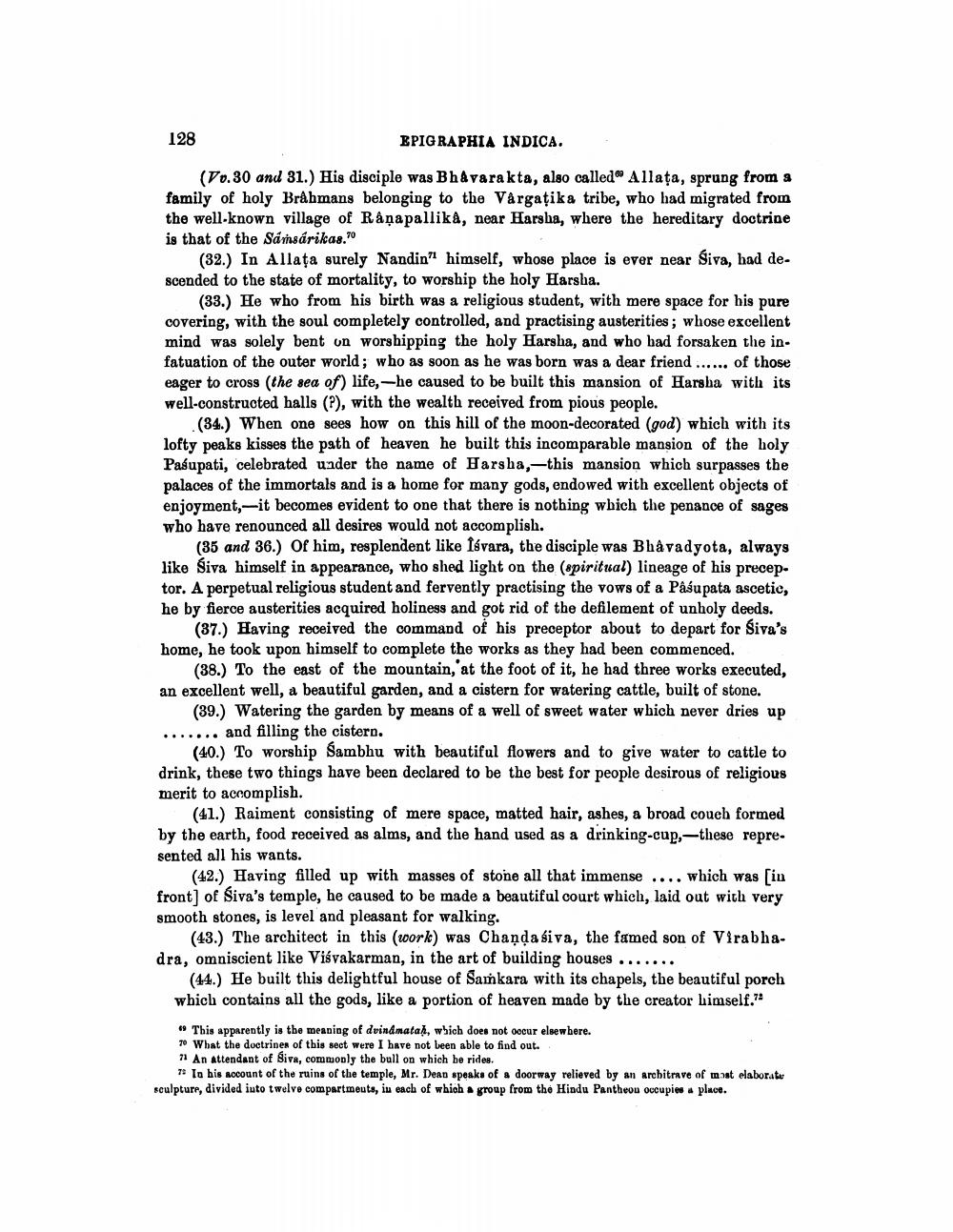________________
128
EPIGRAPHIA INDICA.
(10.30 and 31.) His disciple was Bhavarakta, also called Allața, sprung from a family of holy Brahmans belonging to the Vårgaţika tribe, who had migrated from the well-known village of Rånapallika, near Harsba, where the hereditary doctrine is that of the Sámsárikas."
(32.) In Allaţa surely Nandin" himself, whose place is ever near śiva, had de. scended to the state of mortality, to worship the holy Harsha.
(33.) He who from his birth was a religious student, with mere space for his pure covering, with the soul completely controlled, and practising austerities; whose excellent mind was solely bent on worshipping the holy Harsha, and who had forsaken the in. fatuation of the outer world; who as soon as he was born was a dear friend ...... of those eager to cross the sea of) life,-he caused to be built this mansion of Harsha with its well-constructed halls (?), with the wealth received from pious people.
(34.) When one sees how on this hill of the moon-decorated (god) which with its lofty peaks kisses the path of heaven he built this incomparable mansion of the holy Pasupati, celebrated under the name of Harsha,-this mansion which surpasses the palaces of the immortals and is a home for many gods, endowed with excellent objects of enjoyment, it becomes evident to one that there is nothing which the penance of sages who have renounced all desires would not accomplish.
(35 and 36.) Of him, resplendent like Isvara, the disciple was Bhavadyota, always like Siva himself in appearance, who shed light on the spiritual) lineage of his preceptor. A perpetual religious student and fervently practising the vows of a Pasupata ascetic, he by fierce austerities acquired holiness and got rid of the defilement of unholy deeds.
(37.) Having received the command of his preceptor about to depart for Siva's home, he took upon himself to complete the works as they had been commenced.
(38.) To the east of the mountain, at the foot of it, he had three works executed, an excellent well, a beautiful garden, and a cistern for watering cattle, built of stone.
(39.) Watering the garden by means of a well of sweet water which never dries up ....... and filling the cistern.
(40.) To worship Sambhu with beautiful flowers and to give water to cattle to drink, these two things have been declared to be the best for people desirous of religious merit to accomplish.
(41.) Raiment consisting of mere space, matted hair, ashes, a broad couch formed by the earth, food received as alms, and the hand used as a drinking-cup,-these repre. sented all his wants.
(42.) Having filled up with masses of stone all that immense .... which was sin front) of Siva's temple, he caused to be made a beautiful court which, laid out with very smooth stones, is level and pleasant for walking.
(43.) The architect in this (work) was Chaņdasiva, the famed son of Virabhadra, omniscient like Viśvakarman, in the art of building houses ....
(44.) He built this delightful house of Sankara with its chapels, the beautiful porch which contains all the gods, like a portion of heaven made by the creator himself.
• This apparently is the meaning of dvindmatah, which does not oocur elsewhere. 70 What the doctrines of this sect were I have not been able to find out. 71 An attendant of Biva, commonly the bull on which be rides
7: Io his account of the ruins of the temple, Mr. Dean speaks of a doorway relieved by an architrave of most elaborate sculpture, divided into twelve compartmeuts, iu each of which a group from the Hindu Pantheou occupies a place.




